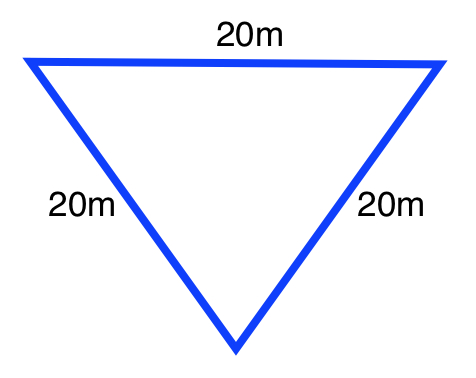All High School Math Resources
Example Questions
Example Question #125 : Geometry
A square rug border consists of a continuous pattern of equilateral triangles, with isosceles triangles as corners, one of which is shown above. If the length of each equilateral triangle side is 5 inches, and there are 40 triangles in total, what is the total perimeter of the rug?
The inner angles of the corner triangles is 30°.
124
188
180
208
200
188
There are 2 components to this problem. The first, and easier one, is recognizing how much of the perimeter the equilateral triangles take up—since there are 40 triangles in total, there must be 40 – 4 = 36 of these triangles. By observation, each contributes only 1 side to the overall perimeter, thus we can simply multiply 36(5) = 180" contribution.
The second component is the corner triangles—recognizing that the congruent sides are adjacent to the 5-inch equilateral triangles, and the congruent angles can be found by
180 = 30+2x → x = 75°
We can use ratios to find the unknown side:
75/5 = 30/y → 75y = 150 → y = 2''.
Since there are 4 corners to the square rug, 2(4) = 8'' contribution to the total perimeter. Adding the 2 components, we get 180+8 = 188 inch perimeter.
Example Question #121 : Geometry
The height of an equilateral triangle is
What is the triangle's perimeter?
6
24
12
8
12
An altitude drawn in an equilateral triangle will form two 30-60-90 triangles. The height of equilateral triangle is the length of the longer leg of the 30-60-90 triangle. The length of the equilateral triangle's side is the length of the hypotenuse of the 30-60-90.
The ratio of the length of the hypotenuse to the length of the longer leg of a 30-60-90 triangle is 
The length of the longer leg of the 30-60-90 triangle in this problem is
Using this ratio, we find that the length of this triangle's hypotenuse is 4. Thus the perimeter of the equilateral triangle will be 4 multiplied by 3, which is 12.
Example Question #482 : Plane Geometry

An equilateral triangle has a side length of 
Not enough information to solve.
An equilateral triangle possesses three sides of equal lengths. Therefore, we can easily calculate its perimeter by tripling the given side length.
Example Question #217 : Triangles

An equilateral triangle has an altitude length of 
Not enough information to solve
An altitude slices an equilateral triangle into two 



We have the length of the altitude of the triangle 

Note, this is only the smallest side of one of the 
Now, the side length can be tripled to calculate the perimeter.
Example Question #483 : Plane Geometry
Find the perimeter of the following equilateral triangle:

The formula for the perimeter of an equilateral triangle is:
Where 
Plugging in our values, we get:
Example Question #23 : Equilateral Triangles
Determine the perimeter of the following equilateral triangle:

The formula for the perimeter of an equilateral triangle is:

where 
Plugging in our value, we get:
Example Question #1 : How To Find The Perimeter Of An Equilateral Triangle
An equilateral triangle has a side of length 
It cannot be determined from the information given.





An equilateral triangle by definition. has three congruent sides. Thus, if one side is 


Since we were given units of feet, our final answer is 
Certified Tutor
All High School Math Resources









































